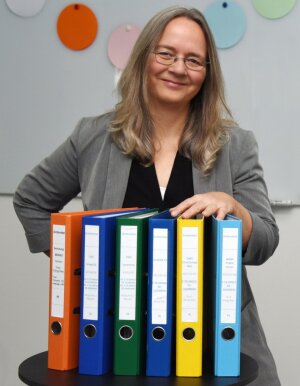
The path to the digital state is a long and rocky one—as several federal administrations have discovered in pursuit of ambitious targets to digitalize their administrative activities. A working group at Friedrich Schiller University is now working to create reliable, long-term structures for digital administration, including by integrating artificial intelligence.
By Sebastian Hollstein
Marianne Mauch heads the »Open Design of Digital Administrative Architectures« working group at the University of Jena and coordinates several projects on the digitalization of administrative processes—making thick paper files a thing of the past.
Image: Anne Günther (University of Jena)The purpose of digitalizing public administration is to create straightforward, efficient processes for everyone involved. Citizens should be able to apply for a new passport or register a change in their residential address from the comfort of their own home; public authorities should be able to digitally process incoming data without the need to shuffle through printed forms. This requires systems that are easy for both parties to understand and offer long-term functionality.
In the course of three projects, computer scientists at the University of Jena are striving to create these long-term structures in collaboration with colleagues from the municipal administration Jena, the Institute for Data Science at the German Aerospace Center (DLR) in Jena, Bielefeld University, the Thuringian Ministry of Finance and other partners from the worlds of research and business.
»We want to map out the entire pathway from the legislation to the digitalized service and make it usable,« says Marianne Mauch, Head of the Working Group on Open Design of Digital Administration Architectures. »The starting point in any new regulation is the legislative text.«
A project entitled »Computer-assisted analysis of electronically available legal norms« (or »Canarėno« for short) has computer science and computer linguistics experts developing a system that automatically reads and attributes all key information in a text. The aim of the project is to deploy AI trained with corresponding data to independently examine a legislative text and identify which key actor—in most cases, a public authority—provides the administrative service in question, who is eligible for this service and what they must do to access it.
The categorization of terms in legal standards is based on the Federal Information Management (Föderales Informationsmanagement, FIM) System, a project pursued by the German federal and state governments to standardize administrative services nationwide.
»We thereby hope to automatically select all the data fields that a digital application form requires and which documents must be submitted,« explains Marianne Mauch. »In this way, public authorities can make new administrative services available more swiftly, respond more flexibly to amendments to existing legal norms, and draft and adapt both forms and information materials. This will save time and money.«
Convenient modular solutions
If such systems are to be straightforward to implement and use, it is vital that the underlying technologies are easy to handle. With this in mind, the team on another Jena-based project—»simpLEX: Making it easier to create and use digital application forms and processing procedures«—is concentrating on describing digital processing pathways as simply and permanently as possible, from the legislative text to the final service. In their efforts to develop a proposal for a reference architecture, the computer scientists have turned to no-code and low-code platforms which facilitate programming by way of visual diagrams in a form of modular system.
»This means that administration professionals can concentrate on legal procedures and official processes without having to master programming in order to make changes to digitalized systems,« explains Mauch. The researchers also rely on open-structured systems based on open-source applications and are integrating open standards and knowledge in such a way that machines can interpret it. Small enterprises and start-ups can therefore use the results for their own activities, which prevents public institutions from becoming dependent on individual providers for their digital administration structures.
Together with the municipal administration in Jena and betterlaw Knowledge Tools Automation GmbH, the experts involved in the project are already building and testing a prototype administrative process for a specific social benefit case. However, before the system used as the basis for research into long-lasting, intelligent services is ready for long-term deployment and expansion into other areas, there are further questions to answer—such as how it can be integrated into existing systems.
Science and administration interlock with each other
In an effort to underpin this system and others like it with a foundation of basic knowledge, the team in Jena is working in parallel on a digital dictionary for public administration. »We hope to establish a nationwide platform that makes information accessible at all times and can be integrated into a number of systems,« explains Mauch.
The data is stored in the form of knowledge graphs—a model that not only establishes a clear definition for each aspect, but also maps out the relationships between them in a way that enables machines to interpret them and draw conclusions. This makes it possible to swiftly identify different authorities’ responsibilities for a given administrative act. »It is exactly these treasure troves of data that serve as the basis for AI,« emphasizes Mauch.
In this context, the projects verge on cutting-edge research, which explains why the working group is connected to the Heinz Nixdorf Chair currently held by Prof. König-Ries and the Competence Center Digital Research (zedif) at the University of Jena.
Dr Frank Löffler, who heads zedif, notes the close collaboration between the fields of science and administration: »Thanks to intensive cooperation between administration specialists across Germany and Europe, the platform we’re developing will not only serve research purposes but above all create an open, transparent source of knowledge about administrative authorities and their internal procedures and interfaces.« As Marianne Mauch adds: »A foundation of reliable knowledge is essential, especially in public administration.« This would certainly serve to benefit future development activities.
